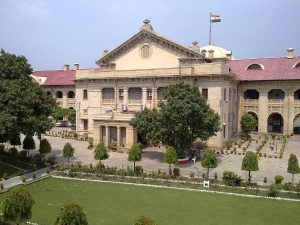
The Allahabad High Court while rejecting the application held that where objection to the jurisdiction of arbitrator is rejected by the Arbitral Tribunal, the only way in which such challenge can be pursued is by challenging the award, as and when it is made by the arbitrator.
The applicant cannot be permitted to circumvent the statutory scheme by invoking the jurisdiction of this Court under Section 11 of the Act of 1996, on the premise that the appointment of arbitrator itself is bad.
A Single Bench of Justice Ashwani Kumar Mishra passed this order while hearing an application filed by Purvanchal Vidyut Vitaran Nigam Ltd (Puvvnl).
The application has been filed by the applicant for appointment of arbitrator under Section 11(6) of the Arbitration and Conciliation Act, 1996.
It is not in dispute that an agreement has been entered into between the applicant and the opposite party in respect of certain work to be performed by the opposite party. The agreement contains an arbitration clause.
The Court observed that on account of accrual of dispute between the parties, the opposite party appointed its arbitrator vide notice dated 6.3.2022 by calling upon the applicant also to appoint their arbitrator. The applicant, however, did not appoint an arbitrator in response to such notice.
The case of the applicant is that they invited the opposite party for conciliation and as the parties had agreed upon to conciliate on the point of differences, as such they did not appoint their arbitrator.
The Court noted that,
The arbitrator appointed by the opposite party has proceeded by treating himself to be the sole arbitrator, as the applicant had not appointed their arbitrator. An objection has been raised by the applicant to the appointment of arbitrator by the opposite party, which has since been rejected on 17.7.2023 by the arbitrator, who has then proceeded further in the matter.
The application has been preferred on 6.9.2022 for appointment of arbitrator. An objection is taken to the maintainability of the application on the ground that once an objection is taken to the jurisdiction of the arbitrator and such objection is rejected, then the only remedy available would be to challenge the ultimate award under the statutory scheme.
On behalf of the applicant, it is contended that the manner in which the opposite party is trying to project its arbitrator as the sole arbitrator cannot be countenanced in the statutory scheme, as also the agreement between the parties.
The Court held that,
In order to appreciate the contentions raised, it is necessary to refer to the statutory scheme contained in the Act of 1996.
Section 11 of the Act of 1996 refers to appointment of arbitrator in a case where parties have agreed to get their dispute resolved by way of arbitration.
Section 16 of the Act of 1996 contemplates challenge to the competence of Arbitral Tribunal, wherein objection is raised to its jurisdiction.
From the statutory scheme, noticed above, it is abundantly clear that where objection to the jurisdiction of an arbitrator is rejected by the Arbitral Tribunal, the only way in which such challenge can be pursued is by challenging the award, as and when it is made by the arbitrator.
The applicant cannot be permitted to circumvent the statutory scheme by invoking the jurisdiction of this Court under Section 11 of the Act of 1996, on the premise that the appointment of arbitrator itself is bad.
“So far as the judgment in Perkins Eastman Architects DPC (supra), relied upon by the counsel for the applicant, is concerned, the Court had merely followed previous judgment of the Supreme Court in TRF Limited Vs Energo Engineering Projects Limited, (2017) 8 SCC 377, which arises out of a different exigency altogether.
In TRF Limited (supra) the Court was dealing with the appointment of an arbitrator, who was ineligible to act by virtue of the embargo contained in 7th Schedule read with Section 12(5) of the Act. A person, who becomes ineligible on account of the said embargo becomes de jure unable to perform his functions, and therefore jurisdiction under Section 11 could be invoked for appointment of arbitrator.
In the facts of the case, no such exigency has arisen. It is not a case that the arbitrator is competent to arbitrate by virtue of Section 12(5) read with the 7th Schedule of the Act. In such view of the matter, the filing of the application under Section 11 of the Act of 1996 would be misconceived, inasmuch as the remedy of the applicant would be to resort to the scheme contemplated in Chapter IV of the Act of 1996 and challenge the award, as and when the occasion so arises. Subject to the observations made above, the application filed under Section 11 fails”, the Court observed while rejecting the application.
The post appeared first on .
